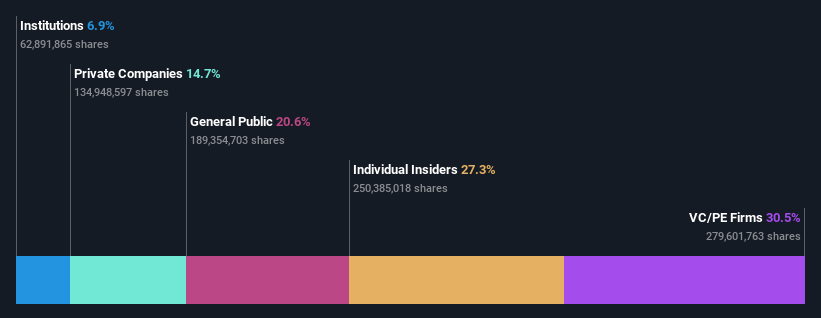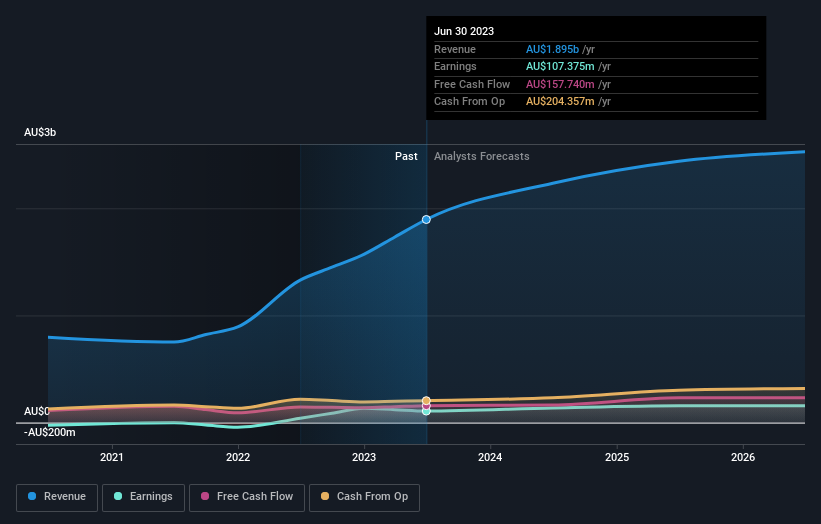- Australia
- /
- Professional Services
- /
- ASX:APM
Private equity firms are APM Human Services International Limited's (ASX:APM) biggest owners and were hit after market cap dropped AU$110m

Key Insights
- APM Human Services International's significant private equity firms ownership suggests that the key decisions are influenced by shareholders from the larger public
- 54% of the business is held by the top 2 shareholders
- Insiders have been buying lately
To get a sense of who is truly in control of APM Human Services International Limited (ASX:APM), it is important to understand the ownership structure of the business. We can see that private equity firms own the lion's share in the company with 30% ownership. That is, the group stands to benefit the most if the stock rises (or lose the most if there is a downturn).
While insiders, who own 27% shares weren’t spared from last week’s AU$110m market cap drop, private equity firms as a group suffered the maximum losses
In the chart below, we zoom in on the different ownership groups of APM Human Services International.
View our latest analysis for APM Human Services International

What Does The Institutional Ownership Tell Us About APM Human Services International?
Institutional investors commonly compare their own returns to the returns of a commonly followed index. So they generally do consider buying larger companies that are included in the relevant benchmark index.
APM Human Services International already has institutions on the share registry. Indeed, they own a respectable stake in the company. This implies the analysts working for those institutions have looked at the stock and they like it. But just like anyone else, they could be wrong. It is not uncommon to see a big share price drop if two large institutional investors try to sell out of a stock at the same time. So it is worth checking the past earnings trajectory of APM Human Services International, (below). Of course, keep in mind that there are other factors to consider, too.

Hedge funds don't have many shares in APM Human Services International. The company's largest shareholder is Madison Dearborn Partners, LLC, with ownership of 30%. Megan Wynne is the second largest shareholder owning 24% of common stock, and Bellinge Holdings Pty Ltd holds about 11% of the company stock. Megan Wynne, who is the second-largest shareholder, also happens to hold the title of Top Key Executive. Furthermore, CEO Michael Anghie is the owner of 2.4% of the company's shares.
A more detailed study of the shareholder registry showed us that 2 of the top shareholders have a considerable amount of ownership in the company, via their 54% stake.
While studying institutional ownership for a company can add value to your research, it is also a good practice to research analyst recommendations to get a deeper understand of a stock's expected performance. Quite a few analysts cover the stock, so you could look into forecast growth quite easily.
Insider Ownership Of APM Human Services International
While the precise definition of an insider can be subjective, almost everyone considers board members to be insiders. Management ultimately answers to the board. However, it is not uncommon for managers to be executive board members, especially if they are a founder or the CEO.
Most consider insider ownership a positive because it can indicate the board is well aligned with other shareholders. However, on some occasions too much power is concentrated within this group.
It seems insiders own a significant proportion of APM Human Services International Limited. It has a market capitalization of just AU$1.3b, and insiders have AU$347m worth of shares in their own names. It is great to see insiders so invested in the business. It might be worth checking if those insiders have been buying recently.
General Public Ownership
The general public, who are usually individual investors, hold a 21% stake in APM Human Services International. While this size of ownership may not be enough to sway a policy decision in their favour, they can still make a collective impact on company policies.
Private Equity Ownership
Private equity firms hold a 30% stake in APM Human Services International. This suggests they can be influential in key policy decisions. Sometimes we see private equity stick around for the long term, but generally speaking they have a shorter investment horizon and -- as the name suggests -- don't invest in public companies much. After some time they may look to sell and redeploy capital elsewhere.
Private Company Ownership
Our data indicates that Private Companies hold 15%, of the company's shares. Private companies may be related parties. Sometimes insiders have an interest in a public company through a holding in a private company, rather than in their own capacity as an individual. While it's hard to draw any broad stroke conclusions, it is worth noting as an area for further research.
Next Steps:
It's always worth thinking about the different groups who own shares in a company. But to understand APM Human Services International better, we need to consider many other factors. Case in point: We've spotted 2 warning signs for APM Human Services International you should be aware of.
Ultimately the future is most important. You can access this free report on analyst forecasts for the company.
NB: Figures in this article are calculated using data from the last twelve months, which refer to the 12-month period ending on the last date of the month the financial statement is dated. This may not be consistent with full year annual report figures.
New: Manage All Your Stock Portfolios in One Place
We've created the ultimate portfolio companion for stock investors, and it's free.
• Connect an unlimited number of Portfolios and see your total in one currency
• Be alerted to new Warning Signs or Risks via email or mobile
• Track the Fair Value of your stocks
Have feedback on this article? Concerned about the content? Get in touch with us directly. Alternatively, email editorial-team (at) simplywallst.com.
This article by Simply Wall St is general in nature. We provide commentary based on historical data and analyst forecasts only using an unbiased methodology and our articles are not intended to be financial advice. It does not constitute a recommendation to buy or sell any stock, and does not take account of your objectives, or your financial situation. We aim to bring you long-term focused analysis driven by fundamental data. Note that our analysis may not factor in the latest price-sensitive company announcements or qualitative material. Simply Wall St has no position in any stocks mentioned.
About ASX:APM
Undervalued with reasonable growth potential.

